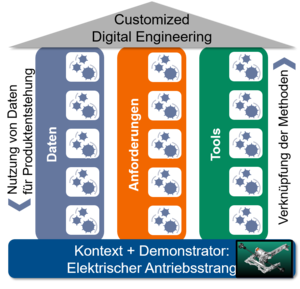FORCuDE@BEV
BAVARIAN RESEARCH ASSOCIATION FOR CUSTOMIZED DIGITAL ENGINEERING FOR BAVARIAN SMES USING THE EXAMPLE OF THE DRIVE TRAIN OF BATTERY ELECTRIC VEHICLES
Working Group Requirements
The aim of the working group Requirements is to support the research association and the involved partners in implementing requirements and assurance processes in the product development process. Based on identified Requirements and existing approaches, a situation-specific concept for integrated data and information management shall be developed.
The subprojects SP 1, SP 3, SP 7 and SP 8 work together especially on a strategy for the holistic collection of data and information requirements, which includes the active involvement of the different stakeholders.
In SP 7 the methods, tools and processes of digital engineering will be linked to the context. The focus here is on the holistic support of the product development process for requirements elicitation and validation. In a first phase, the corresponding interfaces between the individual elements of digital engineering and their coupling to development and validation processes have to be identified together with the industry and research partners in order to create a framework adapted to the context. This initial consideration is carried out purely analytically and without a concrete implementation.
SP 1 and SP 3 create the basis for the coupling of data and information structures by assigning and adapting the digital engineering methods to the transmission development of the electric drive train. This will be done by inferring the need for validation and their characteristics from requirements and integrating them into the development process in such a way that they contribute to an increase in efficiency and optimization of the validation processes (identification of the digital engineering methods and the associated data structures as well as the description of the measurement properties and databases). In addition, SP 4, SP 5 and SP 6 provide the design variables and the data formats used by the tools, which have to be considered.
The quality of the results and the performance of digital engineering depends very much on the collection and definition of the requirements and parameters as well as on the made data selection. Therefore, the method user plays a central role in the introduction of digital engineering methods. For this reason, SP 8 as a cross-sectional project deals with integration conflicts and how they can be overcome in a context-related way. This results in a correlation to all other subprojects.
Disruptive technologies usually also bring about a change in the workplace. Here, acceptance theory provides approaches for the use and implementation of innovations in organizations. Acceptance depends on the characteristics of the technology, its potential benefits and the type of introduction process. In general, the earlier and more open information is provided and the more opportunities for co-determination are offered in the selection of the technology, the higher the probability of acceptance. This is where the research collaboration character of the SP 8 comes into play.
During and especially at the end of the research project, the working group coordinates the transfer of knowledge to the industrial partners. While doing that it is particularly important to differentiate between the company-specific contexts in order to identify adaptation potential of approaches to process integration. Both the mapping of the holistic product development process and the acceptance of the individual methods and tools should be ensured.




